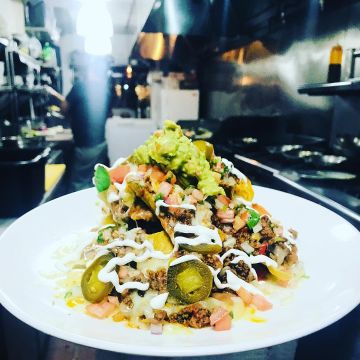Is Mexican Food Healthy And Balanced? Unloading the Nutritional Benefits of Typical Components
The question of whether Mexican food is healthy and balanced welcomes an expedition of its conventional components. Beans and corn work as foundational staples, abundant in healthy protein and fiber. Avocados provide advantageous fats, while different natural herbs and flavors add taste and health benefits - New York Times rated. Together, these components produce a tapestry of nourishment. The healthiness of Mexican food often depends on preparation methods and portion dimensions. What function do these aspects play in determining its general nutritional value?
The Power of Beans: Protein and Fiber-Rich Staples
Often neglected, beans offer as a cornerstone of Mexican food, using a wide range of dietary benefits. Rich in protein, they are an exceptional plant-based option for those looking for to meet their nutritional protein requires. This high protein web content sustains muscle mass fixing and growth, making beans very useful for both vegetarians and meat-eaters alike. Additionally, beans are an exceptional source of dietary fiber, which aids in food digestion and advertises a sensation of fullness, possibly aiding with weight management.
The selection of beans utilized in Mexican dishes, such as black beans, pinto beans, and kidney beans, contributes to a varied flavor account and can enhance dishes nutritionally. Furthermore, beans are reduced in fat and have essential minerals and vitamins, including magnesium, iron, and folate. Together, these characteristics make beans a critical ingredient, supplying both nutrition and nourishment in traditional Mexican fare.

Corn: a Versatile Grain With Nutritional Advantages
Corn sticks out as a versatile grain essential to Mexican food, commemorated not only for its culinary applications yet also for its outstanding dietary account. As a main component in meals like tortillas, tamales, and pozole, corn supplies vital nutrients that add to a well balanced diet regimen. Rich in carbohydrates, it offers as a substantial power resource, while additionally being low in fat, making it a favorable option for numerous dietary requirements.
Corn is a great resource of nutritional fiber, which assists in food digestion and promotes satiety. It contains substantial amounts of vitamins such as B-complex vitamins, which are essential for energy metabolic rate. The visibility of antioxidants, particularly carotenoids, adds to overall health by lowering oxidative anxiety. Additionally, corn is gluten-free, accommodating those with gluten sensitivities. Generally, the nutritional benefits of corn underscore its relevance in conventional Mexican food and its function in a healthy diet plan.
Avocados: Healthy And Balanced Fats and Nutrients in Every Bite
Avocados play a considerable duty in Mexican food, complementing dishes with their creamy structure and rich taste. Past their culinary charm, avocados are celebrated for their outstanding nutritional profile. They are an abundant resource of healthy and balanced monounsaturated fats, which can assist reduced poor cholesterol degrees and assistance heart health. Additionally, avocados are packed with essential minerals and vitamins, consisting of potassium, vitamin E, and B vitamins, adding to overall wellness.
The high fiber material in avocados aids digestion and advertises satiation, making them a beneficial enhancement to any dish. Their special nutrient about his structure can additionally support skin wellness and provide anti-inflammatory advantages. Incorporating avocados into traditional Mexican dishes or enjoying them as a standalone treat can healthy fast food options improve both flavor and nutrition, showing why they are a cherished staple in Mexican food. Overall, avocados provide a delicious way to delight in healthy and balanced fats and critical nutrients in every bite.

Natural Herbs and flavors: Flavorful Health Boosters
While taking pleasure in the abundant flavors of Mexican cuisine, one can not ignore the crucial role that spices and natural herbs play in boosting both taste and health. Active ingredients such as cilantro, chili, and oregano peppers not just add to the dynamic flavor profile however also provide significant health and wellness benefits. Cilantro is recognized for its purifying residential properties, aiding to remove hefty steels from the body, while oregano is loaded with anti-oxidants and possesses anti-inflammatory results.
Chili peppers, a staple in numerous Mexican meals, have capsaicin, which has been linked to boosted metabolism and discomfort alleviation. Additionally, spices like cumin and coriander assistance digestion and might assist in blood glucose policy. Integrating these flavorful health and wellness boosters right into dishes not just boosts the culinary experience but likewise promotes overall health, making Mexican cuisine not simply scrumptious, yet also nutritionally advantageous.
Conventional Food Preparation Approaches: Enhancing Nourishment and Flavor
Standard food preparation techniques in Mexican cuisine play an important role in improving both nutrition and taste, as they typically prioritize classic strategies and fresh active ingredients. Strategies such as nixtamalization, where corn is saturated and prepared in an alkaline solution, not just boost the nutrient profile of tortillas yet also improve their digestibility - happy hour. Furthermore, making use of sluggish cooking approaches, like stewing or braising, permits tastes to blend beautifully while keeping the stability of the components

Frequently Asked Inquiries
Are Mexican Food Portions Typically Larger Than Various Other Cuisines?
Mexican food parts are frequently bigger than those of numerous various other foods. This characteristic shows conventional eating practices, stressing communal sharing and hearty dishes, which can cause a more considerable offering size generally.
Just how Does the Preparation Technique Affect Healthfulness of Mexican Food?
Preparation methods greatly influence the healthiness of Mexican food. Techniques such as cooking or steaming maintain nutrients, while frying can increase unhealthy fat material. Choices of components and cooking designs eventually figure out total dietary worth.
Can Mexican Food Be Customized for Specific Dietary Restrictions?
Mexican food can indeed be customized for particular nutritional constraints. Substitutions, such as making use of corn tortillas for gluten-free diet regimens or incorporating more vegetables, make it possible for individuals to enjoy typical flavors while accommodating different dietary needs.
What Prevail Misconceptions Regarding Mexican Food and Health?
Common false impressions concerning Mexican food include the belief that it is naturally harmful, overly spicy, and exclusively concentrated on fats. In truth, conventional recipes usually include vietnamese restaurant nutritious ingredients and can be customized to numerous nutritional needs.
Exist Healthier Options at Mexican Restaurants?
Much healthier choices at Mexican restaurants commonly consist of grilled meats, beans, and fresh veggies. Picking meals that emphasize whole components and staying clear of hefty sauces can bring about an extra nutritious dining experience, advertising general well-being.
The variety of beans utilized in Mexican recipes, such as black beans, pinto beans, and kidney beans, adds to a varied flavor account and can improve meals nutritionally. Avocados play a considerable role in Mexican cuisine, matching meals with their creamy texture and abundant flavor. Incorporating avocados into conventional Mexican meals or appreciating them as a standalone treat can boost both taste and nourishment, demonstrating why they are a beloved staple in Mexican cuisine. While appreciating the abundant tastes of Mexican cuisine, one can not neglect the crucial role that spices and herbs play in boosting both taste and health and wellness. Standard cooking techniques in Mexican food play a necessary function in enhancing both nourishment and taste, as they commonly prioritize classic strategies and fresh components.